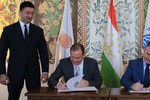Home > News of the Region > News
News

Regional Representative visit summarizes UNHCR achievements in Tajikistan for the last four yearsDushanbe, 13 March, 2014 - UNHCR underlined the recent achievements and developments in the country within the framework of the visit of Mr. Saber Azam, UNHCR Regional Representative/Regional Coordinator for Central Asia to Tajikistan. This visit marked his four- year of presence in the region, and was devoted to discussion of the results, achieved in the field of refugee protection, statelessness, mixed migration and emergency response. Within the framework of the visit to the country, he met with the Prime Minister of the Republic of Tajikistan, Minister of Interior of the Republic of Tajikistan, Deputy Minister of Foreign Affairs of the Republic of Tajikistan and others. During meetings with the Government, Mr. Azam discussed issues related to protection of refugees and asylum seekers, emergency preparedness and response, prevention and reduction of statelessness as well as regional challenges. "I would like to express my gratitude to the Government of the Republic of Tajikistan for the very fruitful cooperation during my presence in the region. The Government of Tajikistan is one of the most important partners of UNHCR in Central Asia. We have a good record of cooperation since 1993 and as a result of my discussion, I am confident that such spirit of cooperation and mutual understanding and respect will continue in the future. UNHCR is ready to support the efforts of the authorities in all areas related to its mandate, including protection and support of refugees, asylum-seekers, statelessness and emergency response. Tajikistan currently plays an important role in light of the 2014 ISAF withdrawal from Afghanistan, and UNHCR would like to remain a solid partner and support in these activities - underlined Mr. Saber Azam. It was underlined that for the last four years UNHCR achieved considerable results in the fields of registration, mixed migration, statelessness, and emergency preparedness. For instance, UNHCR transferred a new software and computer equipment, valued at a total of USD 110,000, which will promote efficient and modernized registration of refugees. This database was developed for the Central Asian governments, and meets the international standards. UNHCR supported rehabilitation and reconstruction of the premises of the Department on Citizenship and Work with Refugees (DCWR) under the Passport Registration Service of MOI, with two interview rooms refurbished and an outside refugee waiting area constructed for the amount of USD 16,000. With these initiatives the UN Agency aimed at enhancing protection and vulnerability-sensitive refugee processing. In the area of emergency preparedness, which is an important in the light of 2014 Afghanistan situation, the Tajik Inter-Ministerial Working Group chaired by the Ministry of Internal Affairs (MOI) was tasked by the Government to prepare a contingency plan for of potential refugee influx from neighbouring states, in particular Afghanistan. UNHCR provided to the MOI technical expertise on humanitarian emergency management, in the two inter-ministerial conferences held in May and July 2013. The MOI has thereafter compiled a draft national contingency plan. UNHCR was actively participating in the Inter-Ministerial Working Group, aimed at revision of the Law on Citizenship, and provided significant inputs to make it in line with the provisions of the international Statelessness Conventions. Currently the draft law awaits submission to the Parliament. UNHCR is ready to embark on further cooperation starting with the prevention and reduction of statelessness in 2014. UNHCR compiled a comprehensive analysis of the civil proceedings of refugee/asylum-seeker cases at the Tajik courts, and a high-level Roundtable aimed at discussions of the outcome was held in December 2013. This initiative was part of UNHCR's efforts to enhance the capacity of the Tajik judiciary and to promote the rule of law. For the last four years a lot was achieved in Tajikistan, and the visit displayed a good level of cooperation between the two sides However, there are issues remaining to be improved. Among them are the 27 deportations that took place during 2013, poor living conditions of refugees, and need for improved legal protection of refugees, the country should pursue being a signatory of the 1951 Convention on Refugees. The Resolution # 325, which does not allow refugees to live in the largest cities should be revised in accordance with the recommendations of the Human Rights Committees. On the regional level, Tajikistan became a part of the Almaty process, aimed at protecting refugees and asylum - seekers with the mixed migratory flows. The high level officials took part in all the conferences, devoted to the mixed migration, and the country was among those which developed and adopted Regional Cooperation Framework and Regional Action Plan, aimed at structuring and operationalizing the Almaty process as the regional platform for cooperation on the mixed migration issues.
13.03.2014 |

UNHCR supplies the Committee of Emergency Situations with Prefabricated Housing Units
15.02.2019

In Kyrgyzstan as much as 18,000 children are invisible
05.02.2019

Meeting of UNHCR for Central Asia with MFA of the Republic of Uzbekistan
29.01.2019

UNHCR AND DUSHANBE SERENA HOTEL LAUNCHED A JOINT APPRENTICESHIP PROGRAMME
28.01.2019

Statelessness as Inheritance
27.11.2018

IBelong Campaign to End Statelessness 4th Anniversary
13.11.2018

A Long Road to Citizenship
31.10.2018
A Long Road to Citizenship
NotATarget: Insight into the Reality of the Humanitarian Aid
05.09.2018
Almaty, 20 August 2018 - World Humanitarian Day is commemorated on 19 August each year.
World Refugee Day 2018 in Central Asia
29.06.2018

Regional Commitments to Prevent Statelessness in Action
12.06.2018
Childhood statelessness, often caused by the lack of birth registration and other legal safeguards

